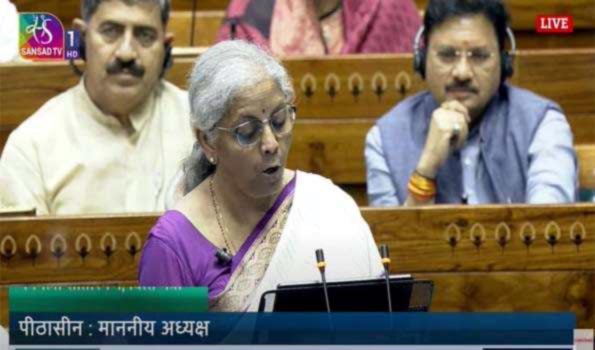New Delhi, July 23 (UNI) Facing flak from the Opposition over unemployment, the Modi 3.0 government’s first Budget on Tuesday announced a Rs 2 lakh crore package to create more jobs while making the tax regime attractive for foreign companies and providing marginal income tax relief to the salaried class.
The Budget presented by Finance Minister Nirmala Sitharaman in Parliament maintained higher Capex to support growth and loosened purse strings for projects in Andhra Pradesh and Bihar to appease crucial National Democratic Alliance (NDA) allies Telugu Desam Party (TDP) and Janata Dal (United).
“I am happy to announce the Prime Minister’s package of 5 schemes and initiatives to facilitate employment, skilling and other opportunities for 4.1 crore youth over a 5-year period with a central outlay of Rs 2 lakh crore,” Sitharaman said while presenting the seventh successive Budget.
The Minister said that one crore youth will be skilled by top companies in five years. A 12-month internship program with a monthly allowance of Rs 5,000 was also announced.
The stock market response to the Budget was lukewarm with the BSE Sensex shedding 73 points.
Hailing the Budget, Prime Minister Narendra Modi said that it ensures inclusive growth, benefiting every segment of society and paving the way for a developed India.
Leader of Opposition (LoP) Rahul Gandhi, who has been aggressive in cornering the government over a host of issues, termed the Budget as ‘Kursi Bachao’ Budget – indirectly referring to the government’s compulsion to keep the allies happy.
Earlier, Sitharaman announced a special financial package of Rs 15,000 crore for Andhra Pradesh and said that concerted efforts would be made to fulfill the commitments under the Andhra Pradesh Reorganisation Act. The Finance Minister said that the special financial package will be arranged in the current financial year to develop the capital of Andhra Pradesh.
In the case of Bihar, Sitharaman announced that the Centre will support development of an industrial node at Gaya on Amritsar-Kolkata Industrial Corridor. Road connectivity projects worth Rs 26,000 crore would also be taken up in the state. The road projects include Patna-Purnea Expressway, Buxar-Bhagalpur Expressway and additional two-lane bridge over the Ganga at Buxar.
Despite unveiling several populist schemes, Sitharaman stuck to fiscal prudence and pegged the fiscal deficit at 4.9% of the GDP for FY25 from the earlier estimate of 5.1% projected in the interim Budget this year. She emphasized that the fiscal consolidation path announced by her in 2021 has served the economy very well, and the government will aim to reach a deficit below 4.5% next year.
Tax buoyancy and record dividend transfer by Reserve Bank of India (RBI) have contributed to the government’s lower fiscal deficit target.
Ahead of three state elections, the Budget has made an all-out attempt to woo voters, especially the youth and salaried middle class. In the new tax regime, it has enhanced standard deduction to Rs 75,000 from Rs 50,000, resulting in a saving Rs 17,500. As a result, no income tax will be payable for income up to Rs 3 lakh annually.
The Budget also provided impetus to manufacturing by proposing 12 “Plug and Play” industrial parks, reducing compliance burden for MSMEs and setting up e-commerce export hubs. It also exempted nearly two dozen critical minerals from custom duties.
Looking to take forward the success in local manufacturing of electronics, the Budget 2024-25 has also proposed to cut basic custom duty (BCD) on mobile phones, mobile PCBA (printed circuit board assembly) and mobile chargers to 15% from 20%.
In order to enhance domestic value addition in gold and precious metal jewellery in the country, the Finance Minister proposed to reduce customs duties on gold and silver to 6% and that on platinum to 6.4%. The lower custom duty would mean prices of these items going down.
At the same time, Sitharaman also provided relief to cancer patients exempting three more cancer drugs from customs duties.
For boosting foreign capital inflows, the Budget also proposed to reduce the corporate tax rate on foreign companies from 40 to 35 per cent. Seeking to bolster the Indian start-up ecosystem, Sitharaman announced to abolish angel tax for all classes of investors.
Top industry body CII hailed the Union Budget saying it provides continuity to India’s successful holistic economic strategy to drive growth with inclusion.
“The Union Budget 2024-25 takes forward the government’s successful economic strategy of the previous two terms, led by investments and reforms and focused on inclusion and empowerment. The announcement on collaboration with States to take forward the next gen reforms with the twin objectives of employment generation and growth, is a welcome step,” CII director general Chandrajit Banerjee said.
Infrastructure boost remained the cornerstone of the Budget as in the previous year with the Finance Minister provisioning Rs 11.11 lakh crore for capital expenditure (capex) during FY25. Housing for the poor under PM Awas scheme and expansion of rural road network were some of the key highlights of the Budget.
Another key focus area of the Budget was energy security with the Minister promising to bring out a policy document on appropriate energy transition pathways that balances the imperatives of employment, growth and environmental sustainability. Solar energy also got a special boost in the Budget.











